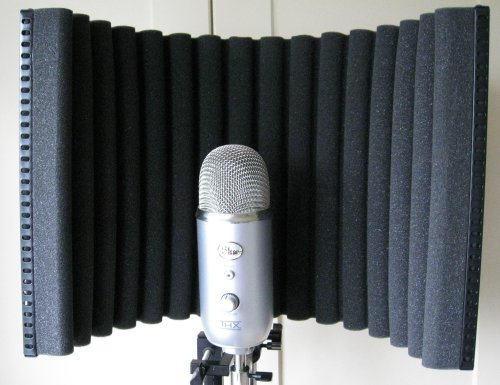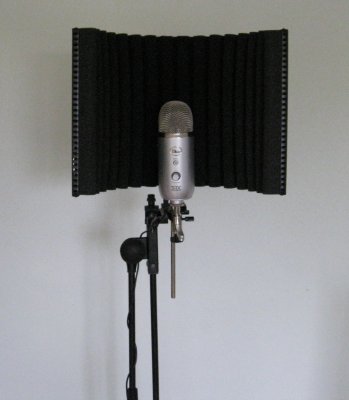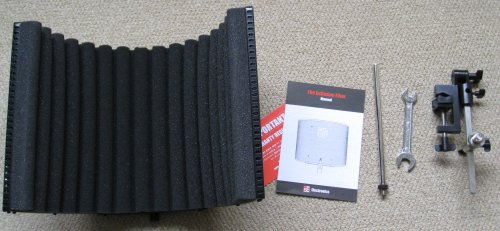There’s one big issue that affects podcasters recording their voice at home, and that’s the “sound” of the room, or the room’s acoustics.
In a home recording studio, there are frequently noises that are noticeable on recordings – the fan on your PC, people in other rooms, noise from outside (such as traffic, or birds twittering outside your window). one of the other big pitfalls is sound reflection – where your voice bounces off the painted walls, windows or fixtures in the room, meaning that you can “hear” the room that you’re recording in.
Fixes for problems with room acoustics isn’t cheap – you’re either looking at buying expensive soundproofing material, or getting a voice booth (a soundproofed cupboard) for your recording. Neither are cheap.
DIY solutions such as hanging your duvet on the wall behind you can make a difference, as can using thick wallpaper, not paint, to decorate your room, but thanks to the product we’re looking at on this page, there is a decent compromise – The sE Electronics Reflexion Project Filter.
Before we look at this in-depth, note that there are two products out there from SE. There’s their full-price Reflexion Filter (costing over £200), or their “Project” version, which is almost as good and available for just over the £100 mark.
We’ve been using the Reflexion Project to record some of our podcast content recently, and have been very impressed with the way it works. Effectively, it’s a portable “voice booth” that surrounds your mic with 180 degrees of high quality sound diffusing and absorbing material. The practical upshot is if you use this for recording your voice, you will dramatically reduce the amount of room ambience that gets recorded.

The science bit:
The Reflexion works using various layers – acoustic absorptive material at the front, a layer of punched aluminium to allow sound through and diffuse it, absorptive wool, aluminium foil to dissipate energy and break up the LF, plus an air gap as an acoustic barrier. The Reflexion prevents reflected sound from reflecting back from the rear and sides of the mic, without adversely affecting the polar pattern of the microphone.
The Reflexion Project is extremely well-made. The makers have been blatant in pointing out that, due to the number of cheaper imitations out there, they’ve brought out the “Project” as a budget alternative to their £200 flagship product. For us, this budget version doesn’t disappoint.

Fitting the Reflexion
The Reflexion Project kit comes with all of the required stuff to mount it on an existing mic stand (even including the spanner). Getting it connected is fairly straightforward. Essentially, you clamp the main bracket onto your mic stand, then attached the mic to the bracket. There’s a track that allows you to slide the mic backwards and forwards – the further back, the less reflections. Once put together, it does look slightly unwieldy, but at the end of the day, it’s there to do a job, and not to look pretty.

We’re using ours with a basic adjustable mic stand, a pop shield, and with our mic of choice (for the moment), the Blue Yeti USB Microphone.
Summary
We’re very impressed with the SE Reflexion Project Filter. We’re actively using this on our podcasts at the moment, and it’s great for largely killing problematic room acoustics for us, as well as killing computer fan noise on our recordings.
We got ours from Absolute Music, but as they haven’t let us join their online promotion scheme, we’re offering links to the Reflexion range from two alternative equipment sellers. For more details check out the Reflexion at Gears for Music.
